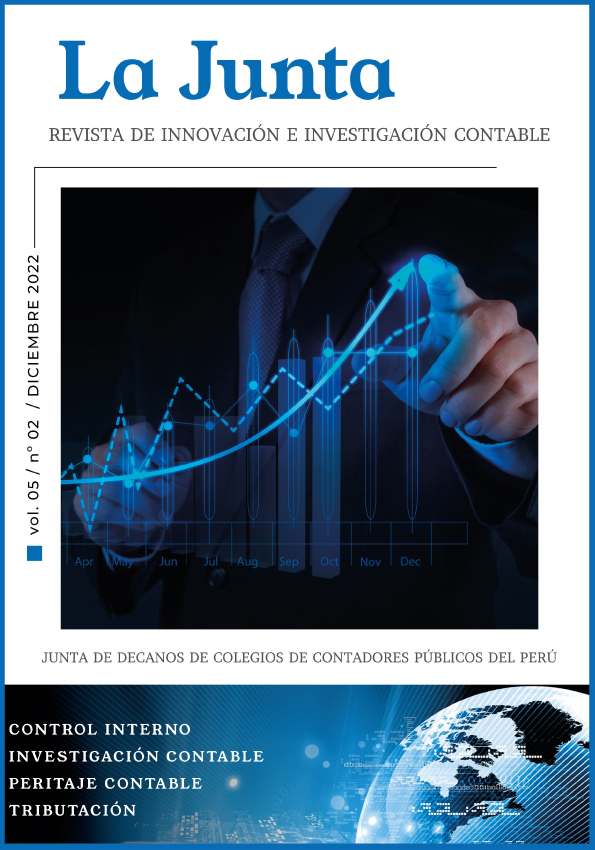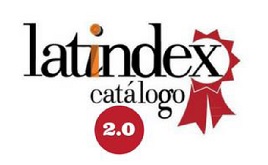Analysis of the factors that limit research in the profession of Public Accountant in Peru, year 2022
DOI:
https://doi.org/10.53641/junta.v5i2.95Keywords:
scientific research, limiting factors, public accountant, accountingAbstract
The present research work carries out a reflexive analysis of the account research activity developed in the country, taking into account its relevance in the increase of the epistemic heritage of the accounting discipline, while making visible the need
to strengthen the skills of professionals of accounting. Its objective is to determine the factors that limit research in the Public Accountant profession in Peru, in 2022.
It is basic research, with a quantitative approach and a descriptive level. Its design
is not experimental-transectional; the survey was developed as a technique and the instrument was a questionnaire designed for this study, composed of dichotomous approaches, to answer the research question. The population is made up of 29,940 Certified Public Accountants in the Departmental Colleges at the national level, and a representative sample of 382 accounting professionals was taken through a conglomerate survey. The results indicate that there are personal and institutional factors that limit accounting research, at a medium level, with an incidence of 52% and 66%, respectively. It is concluded that institutional factors associated with representative institutions, editorial institutions or policies, and universities limit research production more strongly than personal factors. Among these, the lack of depth of the academic products and the lack of support for training stand out, which is why these institutions are invited to include certification programs for the acquisition of research skills and thus contribute to the construction theory of accounting as a scientific discipline.
Downloads
References
Arquero, J., Jiménez, S. M., y Laffarga, J. (2016). Utilidad percibida de la producción académica-contable. Opinión de los profesores universitarios y de los profesionales. Revista de Contabilidad, 19(2), 239-251.
Arquero, J. y Donoso, J. (2013). Docencia, investigación y burnout: el síndrome del quemado en profesores universitarios de Contabilidad. Revista de Contabilidad. 16(2)94-105.
Barona, N. (2019). Evolución y nuevas tendencias de la investigación contable. Actualidad contable FACES, 23 (40). 9-27.
Chamorro González, C., Patiño Jacinto, R. y Vásquez Peñaloza, L. (2020). Women accountants in academic and research spaces in Colombia. En C.R. Lehman (Ed.) Resistance and Accountability (Advances in Public Interest Accounting). (pp. 23-34). Emerald Publishing Limited, Bingley.
Chamorro González, C. y Irausquin, C. (2021). Estudios de género en la disciplina contable: revisión bibliométrica. Revista Venezolana de Gerencia, 26(6), 82-105.
Chía Suárez, M. (2015). Desafíos de la investigación contable, el ejercicio profesional en armonía con la investigación académica. Saber, Ciencia y Libertad, 10(2), 123-132.
Erazo-Portilla, C., Plaza-Castillo, M. y Camacho-Marín, R. (2020). Didáctica de la contabilidad como herramienta de investigación. Praxis Pedagógica, 20(27), 386-406.
Escobar-Pérez, B. García-Meca, E., y Larrán-Jorge, M. (2014). Factores que influyen sobre la producción científica en contabilidad en España: la opinión de los profesores universitarios de Contabilidad. Revista Española de Documentación Científica, 37(2).
Guao-Samper, R. (2020). Teoría crítica e investigación contable. El caso de la opacidad de la información financiera. Actualidad Contable FACES, 23(40). 28-51
Hatfield, P. and Shelly, W. (2015). The Role of Gender in Academic Finance Journals: An Exploratory Study. American Journal of Business Education, 8(4), 249-258.
International Federation of Accountants (2015). Manual de Pronunciamientos Internacionales de Formación. IES.
Lemos, L.C., Barufaldi, R. y Paulo, N. (2015). La feminización del área contable: un estudio cualitativo básico. Revista de Educação e Pesquisa em Contabilidade, 9(1), 64- 84.
Molina-Hurtado, Y. y Fonseca-Gordillo, J. (2019). La investigación formativa contable en universidades de Tunja. Revista de Investigación, Desarrollo e Innovación, 10(1), 93- 106.
Pérez, V. y Pinto-Perry, G. (2016). La investigación contable como herramienta didáctica en la docencia de la contabilidad. Ciencias Administrativas, (7), 37-47.
Orendain, MC., Orendain, M., Chávez, M. y Villa, M. (2021). La certificación profesional en los Contadores Públicos. Revista Iberoamericana de Ciencias, 8(3). 91-100.
Real Academia Española (2022). Diccionario de la Lengua Española.
Ríos León, R. (2013). La formación para la investigación de contadores públicos colombianos: un asunto de estrategia. Revista científica “General José María Córdova”, 11(11), 175-206.
Tejedor, F. (2018). Investigación educativa: la utilidad como criterio social de calidad. Revista de Investigación Educativa, 36 (2), 315-330.
Molina-Hurtado, Y.A. y Fonseca-Gordillo, J.E. (2019). La investigación formativa contable en universidades de Tunja. Revista de Investigación Desarrollo e Innovación, 10(1), 93-106.
Valero, G., Patiño, R., Yaya, W. y Chaverra, J. (2022) Tendencias en investigación contable: revisión bibliográfica. En G. Valero, R. Patiño y J. Chaverra (Eds.). Educación e investigación contable en Colombia: una mirada holística de la disciplina. Fondo Editorial CEIPA.
Vera-Muñoz, M., Martínez-Méndez, R. y Martínez-Méndez, J. (2019). La certificación profesional y la capacitación, como apoyo al contador público en las competencias que le requiere el mercado laboral. Horizontes de la Contaduría en las Ciencias sociales (10). 58-81.
Viloria Ortega, N. (2013). Los retos de la contabilidad. Una visión desde los avances de la teoría contable. Lúmina, (14). 40-52.
Downloads
Published
How to Cite
Issue
Section
License
Copyright (c) 2023 Umner Llonce Silva Santillán, Leidy Vanesa Vargas Vargas

This work is licensed under a Creative Commons Attribution 4.0 International License.








